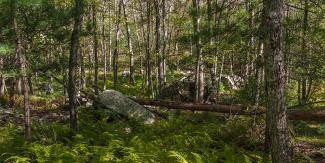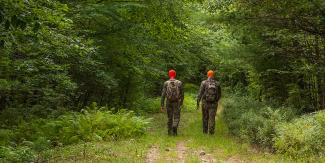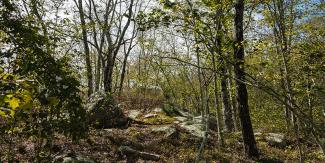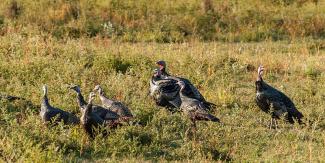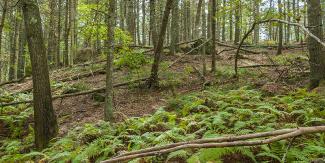Forest Stewardship Program
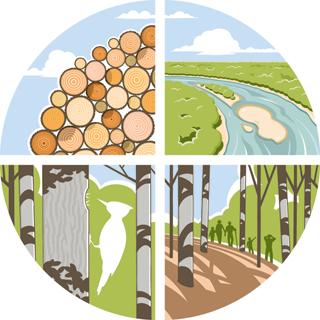
The Rhode Island Forest Stewardship Program (FSP), in cooperation with the USDA Forest Service, supports private forest landowners' efforts to manage, enjoy, and care for their land long-term. This program is designed to both recognize the public benefits of privately-owned working lands and good land management, and to help private landowners protect the ecosystem benefits and value of their forest.
The FSP provides information and resources on forest planning, information and education about forest issues, and supports forest landowner access to Rhode Island’s current use tax program for their forest land, The Farm, Forest, and Open Space Act (FFOS).
The FSP is not a cost-share program. There is no financial assistance available through DEM. However, the Natural Resources Conservation Service (NRCS) offers financial assistance for Forest Stewardship Plan development and other forestry-related activities through the Environmental Quality Incentives Program (EQIP). You can also contact the Rhode Island NRCS office at 401-828-1300. The American Tree Farm System is an additional source of information and is also a national forest landowner recognition program, managed in RI by the Rhode Island Forest Conservators Organization (RIFCO).
Jump to:
The Farm, Forest, and Open Space Act (FFOS)
FFOS reduces property tax on forest land under active management. Find more information on this program at dem.ri.gov/ffos
PLANNING FORESTRY ACTIVITIES ON YOUR FOREST LAND
If you want to manage your forest land, or are planning to harvest timber on your land, you should review the information below.
A forester is a professional whose work is to assess woodlands, identify or estimate timber and non-timber values, recommend/design/supervise possible activities, including harvesting, to accomplish a range of goals, and help landowners plan for the future. Foresters who work as consultants often provide services to woodland owners, the most common being:
- preparing written, long term Forest Management Plans, and
- working with the landowner to plan & oversee a timber harvest.
Even if you only have one project in mind, it is advisable to choose a forester who will be available for future needs/projects – as you might choose an accountant, health care provider, or tax preparer.
By contrast, a logger is a professional whose primary job is the actual harvesting of trees, including cutting down and "yarding" them to a landing, yard or roadside area where they can be further processed and sorted, then trucked to a mill or other location that uses the wood. Loggers must be licensed in RI. LINK? Is there one?
An arborist is a professional who specializes in caring for and/or removing individual trees around homes and other buildings. Arborists must be licensed in RI.
PLAN BEFORE YOU HARVEST
The resources below have important information for anyone thinking about harvesting timber on their land, whether developing concrete goals for their forest land, or understanding what considerations they need to be aware of when working with contractors when planning for a timber harvest. And if there are wetlands of any type in the vicinity of the planned harvest, the Forestry Best Management Practices for Water Quality is essential reading.
Planning for the Future
Good planning should also include thinking about estate planning, check out the RIFCO publication: Protecting Your Legacy: A Rhode Island Landowner’s Guide to Conservation-Based Estate Planning
FORESTRY BEST MANAGEMENT PRACTICES FOR WATER QUALITY PROTECTION
HARVESTING YOUR TREES & Intent-to-Cut
Whether or not you have the advice of a forestry consultant, you should review the above information, before you move ahead on harvesting your trees. If you are making an agreement with a logging operator you also need to know the information below, including the state requirements for submitting an Intent-to-Cut notice to DAFE:
When an ITC is required
RI Gen. Laws §2-15-2 and RI Gen. Laws §2-15-4 specify that whomever is harvesting trees (landowners, developers, or loggers) must file an ITC to RIDEM-DAFE at least five days before cutting or sawing wood on private land:
- where more than five acres are being cut, OR
- if the annual cut exceeds 5,000 board feet or 25 cords in any one year, OR
- if there are wetlands present.
The ITC not a permit, but an official notice that is required by law. Its aim is to help landowners ensure that a harvesting project is consistent with the practices of sound forestry. Private landowners have the right to make decisions about managing their forested property, however, it is the duty of property owners and developers to make sure that they are following all required laws and regulations before cutting or development takes place.
If you are still not sure whether an ITC is required, contact the Stewardship Forester.
The online permit system requires that the logging contractor submit the ITC information and the fee ($25) on behalf of the landowner. This means the logger must have an active Wood Operator License, which will allow them to sign into their account on the portal, submit the application, and make the electronic payment. Once the ITC application is submitted, the Forest Stewardship Forester will review the information received. If accepted as complete, the Stewardship Forester will call or email to schedule an inspection of the harvest site. Once the inspection has occurred, the form will be approved and the Wood Operator will be able to download a signed copy. A physical Notice will be posted at the harvest site.
Managing Your Forests for Resilience & Carbon Markets
A healthy forest, one that is able to grow and regenerate, requires the right growing conditions of moisture and light and seasonal conditions. Increasingly, extreme events and increasing temperatures can weaken the ability of individual trees that make up the forest to withstand pests and diseases, to extract sufficient water from the soil for their needs, and to produce seed that will germinate and grow into new trees, and sustain the forest.
When developing a forest management plan including a goal of resiliency and health is recommended, as essential as wildlife or recreation or timber production. In fact, good management practices address resiliency, even when not specifically identified as a management goal. This might not seem necessary to include in your plan but opportunities are developing that would allow smaller forest landowners take part in the carbon markets. And having a stated goal of climate resiliency and carbon storage can be helpful in accessing that opportunity.
While carbon markets are mainly in the early stages of availability in RI, they are expected to continue to develop. And if you are already managing your forests, or planning to manage, this could be a low effort opportunity for some additional income. Obviously, for smaller acreages, the total amount might not appear significant, but over time can add up, and with no real extra effort on your part.
Even if the carbon markets are not of interest to you, managing with the goal of resilience and long-term forest health is important. Take a look at the resources below which discuss resiliency and management, and also carbon markets. And discuss this with your consulting forester how to include resiliency and carbon into your management planning.
Carbon Information & Resources:
- UMASS Forest Carbon: The Essential Natural Solution for Climate Change
- A Guide to Forest Carbon in the Northeast
- Northeast Forest Carbon and Climate Partnership
- Forest Carbon Cheat Sheet - American Forest Foundation: Part 1 The Fundamentals; Part 2 Measuring Carbon; Part 3 Forestry & Carbon
RESOURCES FOR RI FORESTRY CONSULTANTS
For foresters working in RI, we have several additional resources and information that may be helpful for writing management plans or for discussing carbon with landowners and for including carbon information in those plans:
FFOS management plan template and plan-type comparisons, how-to information on explaining carbon goals and markets to landowners and plan language, and tools for estimating carbon benefits you can include in your management plans (if there are other tools you would like to see developed, let us know).
NOTE: All pdf files open on your desktop and can be downloaded. All other files (Word, Excel, etc.) download to your computer automatically.
Links to other good resources:
Reforestation Guide: Enrich, Restore, and Adapt Northern Forests is a practical resource is for foresters, landowners, and managers interested in using tree planting as a forest management tool.
COMING SOON!!! RI Landscape Management Plan and RI iNaturalist Project
OTHER PARTNERS & RESOURCES
- RIDEM Forest Legacy Program
- USDA Natural Resources Conservation Service (NRCS)
- RI Forest Conservators Organization (RIFCO)
- Rhode Island Woods
- RI Woodland Partnership (RIWP)
- RI Tree Farm System
- RI Conservation Districts
- RI Natural History Survey (RINHS)
- RI Resource Conservation & Development Council (RIRCD)
- RI Land Trust Council (RILTC)
- Masswoods.org (UMass Amherst)
- Forest Stewards Guild
- Family Forest Carbon

